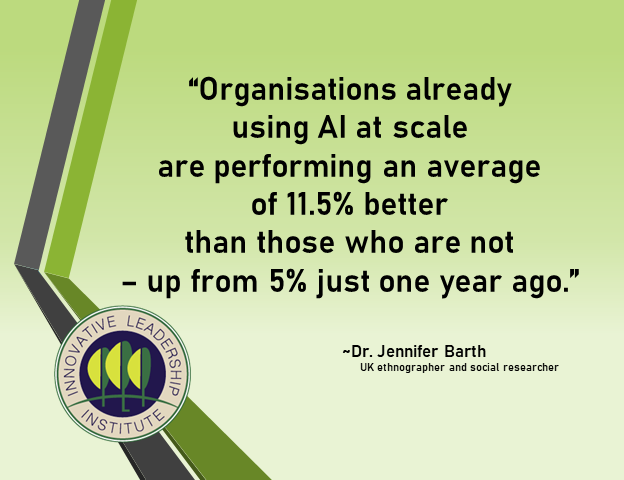Accelerating Competitive Advantage with AI: How Organisations are Moving from Experimentation to Business Impact
 This blog is provided by Dr. Jennifer Barth and her team, as a companion to her podcast Accelerating Competitive Advantage with Artificial Intelligence.
This blog is provided by Dr. Jennifer Barth and her team, as a companion to her podcast Accelerating Competitive Advantage with Artificial Intelligence.
Research Overview
We collaborated with Microsoft for the third year running during summer 2019, to explore the current state of AI across four specific industries, retail, manufacturing, health and financial services within the UK. We analysed how organisations within these sectors can implement AI in an ethical, cost effective and optimal way.
With rapid advancements in AI, our research answers questions around ethics, responsible innovation and the future impact of AI on our industry sectors and workforces. We gathered practical advice on how organisations can create robust and scalable AI investments.
Key Research Findings
- 56% of organisations in the UK are using AI enabled solutions with notable advances in use of machine learning and analytics
- Organisations already using AI at scale are performing an average of 11.5% better than those who are not – up from 5% just one year ago
- Last year 51% of organisations did not have an AI strategy at all, a number which has decreased to 37% of organisations this year.
- 38% of business leaders want to be leaders in AI innovation – a figure that has more than doubled since last year
Report Findings
How exactly can UK organisations scale their use of AI and secure a competitive edge while, at the same time, doing so in a way that is ethical, responsible and in line with the needs of their employees, partners and customers? Our research explores three key themes that allow organisations/leaders to truly accelerate their competitive advantage through AI enabled solutions.
- Moving from Experimentation to Implementation
Of all the business leaders we surveyed, only 8% classified their organisation as Advanced AI users while nearly half (48%) currently remain in the experimentation phase. Thus, over half of all British businesses using AI don’t seem to have an AI strategy at all, mainly because they lack a clear understanding about what AI can do for their business. As the people tasked with setting an organisation’s strategic direction, leaders need to quickly ascertain exactly what role AI can and should play within their organisation and provide adequate training and resources for successful AI implementation. Currently, only 21% of leaders have completed training in how they can use AI in their jobs, and only 21% are sure they can meet staffing needs related to skill changes caused by AI. Overcoming these obstacles will be crucial in enabling UK organisations to implement AI quickly and responsibly across their organisations to stay relevant in the future.
Luckily, advanced AI-organisations recognise this as those that are successfully employing the technology at an organisational level, rather than just a local or departmental one, are much more adept at evaluating the business benefits of AI investments and ensuring they have a clear objective at the outset. They are also more agile in how they operate than those that are experimenting with AI, meaning they are better equipped to respond to customer and employee needs, changes in technologies, or market conditions
- Create a Culture of Participation
Ensuring workers have the tools to augment their job roles with AI is critical – The change is as much about culture as it is about technology. It involves a move away from a situation in which only certain people or business functions have the tools to experiment with AI, to a democracy – where everyone has the building blocks to integrate AI into their working day and actively contribute to the development of new solutions, regardless of where they sit in the organisation
Building out your culture to equip your people will be the best competitive asset you have. Our research found AI-advanced businesses lead to stronger democratic practices, as organisations that are more advanced in their use of AI are more likely to:
- Ensure AI is used responsibly
- Understand and develop the skills and mindset needed to work with AI
- Create and implement workforce diversity plans
- Make AI work for everyone
By establishing a clear set of developmental standards and operating principles to ensure the technology is deployed ethically, with attention to bias and in a way that actively promotes diversity and inclusion. Our research shows us that firms advanced in AI are better at tackling overall bias, as 77% of advanced organisations say they have the capability to identify bias in their organisation when it is observed (58% experimenting).
Two of the most important criteria here are the ability to accurately identify all ethical issues as they arise and understanding how to respond when they do. Crucially, the more advanced an organisation is in its AI-led digital transformation, the more likely it is to have established the operational logistics to deliver against an ethical criteria.
Take Away: Tips for Scaling AI successfully
- Treat it as a business change programme – this needs to be something the entire organisation is involved and invested in
- Make sure everyone is supported in knowing how the technology works – an understands how they can use AI to be more effective in their role
- Embed a culture of integrity and ethical behaviour – it’s up to leaders to communicate internally and establish a framework for making ethical decisions – companies advanced in their AI implementation know how to operationalise solutions to these problems
Research Methodology
Our research used a mixed-method approach to analyse the current state of AI within the UK in the spring and summer of 2019. Including an in-depth literature review of academic, industry and media sources, subject matter expert interviews and case studies across a variety of academics, professionals and organisations, a social experiment on augmentation. The research also included a survey of 1000 leaders and 4000 employees in organisations with over 500 employees with focus on four industries (finance, retail, manufacturing, and healthcare). From these sources, we developed a set of dimensions as a lens through which to consider the opportunities for AI in the UK today.
About the Author
Dr Jennifer Barth is an experienced ethnographer and social researcher, with a PHD from the University of Oxford. Her work is informed by empirical research on the intersections of emerging technologies and socioeconomic change. She provides companies with thought leadership and media engagement opportunities on global issues impacting and shaping our current and future socio-cultural lives.
Her current research focuses on the human impact of artificial intelligence (AI) through fieldwork experiments with IBM Watson and other providers, leading Digital Transformation and AI implementation research for Microsoft, Reinventing Loyalty with Adobe, and more. She is skilled at research design, qualitative research and analysis, quantitative analysis, new methods using emerging technologies and working with people to bring to life the stories behind numbers.


Leave a Reply
Want to join the discussion?Feel free to contribute!